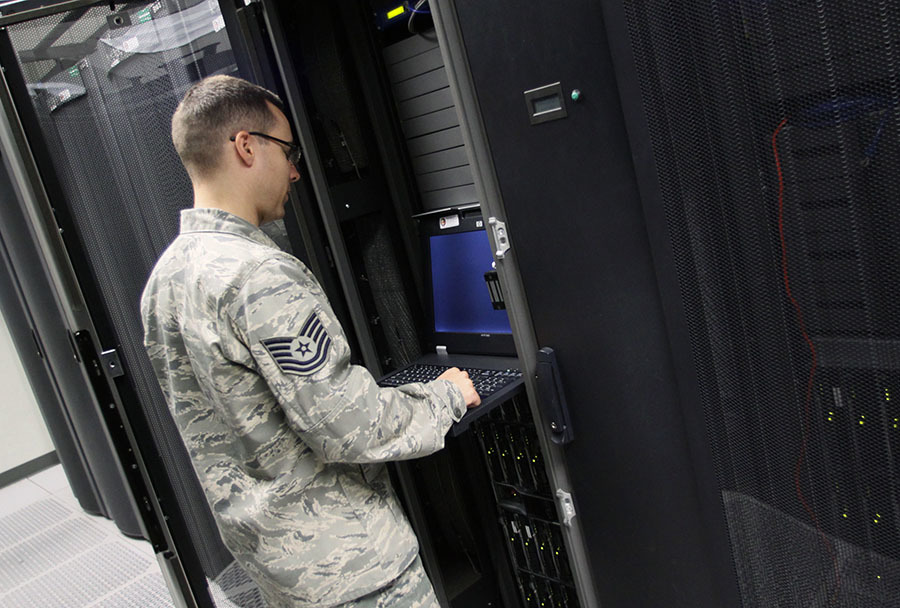General Paul Nakasone, head of the US Armed Forces cyber command, said the United States is currently focused on the approach that the US military should always take action in cyberspace and counteract adversaries.
“In this regard, at present, as an approach to the implementation of the Ministry of Defense's Defend Forward strategy, we have focused on constant active participation - the idea that we should tirelessly take active steps in cyberspace, building the potential of our partners and counteracting to our opponents, ”the Pentagon press service quoted him as saying.
The defense department also announced the expansion of the presence of American cyber forces outside the United States to counter “intruders”.
“Over the past few years, the command has deployed a number of cyber groups around the world to counter attackers on mission-critical networks,” the defense department’s website said.
The main priority of the Cyber Command Paul Nakasone called "ensuring the security and legitimacy of the 2020 elections."
A statement by the US Department of Defense also states that one of the tasks of American cyber forces is to counter attempts by "authoritarian" regimes to "influence, including destructive, US national unity and democratic processes in the country."
“The number of unreliable subjects is increasing, and their methods are becoming more sophisticated. The resumption of rivalry between the great powers means that we should expect hostile cyber activity aimed not only at espionage, but also at destroying and undermining the foundations, as well as, of course, exerting influence, ”said Nakasone.
In addition, the Pentagon reported that “for the use of cyber power”, Nakasone manages a “cyber mission” formed of 133 groups, which include troops of the Ground Forces, Navy, Air Force and Marine Corps.
According to Nakasone, an expanded mission and additional powers will allow the "US Cyber Command to influence the cyber environment in a responsible but decisive way."
- Pentagon
- AFP
Cyber activity
Recall that in August 2017, U.S. President Donald Trump, by his decree, founded the tenth unified combat command - Cyber Command.
In June 2018, The New York Times reported that the U.S. Cyber Command was transferred to combat status and was able to conduct regular offensive operations. According to the new principles of work, US military hackers must “disable cyber weapons before they are used,” and also have the right to carry out subversive activities in computer networks of other states.
In September of the same year, the head of the White House approved an updated US cybersecurity strategy. It focuses on measures that should be taken in response to the "activity" of Russia, Iran, China and the DPRK.
As noted by John Bolton, who was then president’s adviser on national security, this strategy involves both defensive and offensive approaches. According to him, the United States will be guided by its provisions, responding to measures by other states in cyberspace that are directed against the United States.
In June 2019, Bolton said at a forum organized by The Wall Street Journal that the United States intended to increase the number of offensive operations in cyberspace.
For several years in a row, NATO has been conducting massive cyber missions to the Cyber Coalition. Last December, they were held in the Estonian city of Tartu. 900 military men from 28 alliance countries and partner states took part in the maneuvers. The military practiced their actions "to protect NATO networks as part of simulation scenarios to contain cyber threats."
In addition, US troops participate in the NATO Cyber Defense Center in Tallinn, which was awarded the status of an international military organization in 2008. This organization holds the largest Locked Shield cyber security exercises in the world every year since 2010.
- US military
- Reuters
- © Rick Wilking
"Despicable"
As an expert at the International Institute for Humanitarian and Political Research Vladimir Bruter noted in a conversation with RT, building up US activity in cyberspace is not defensive, but “purely political.”
“Washington blocks the Internet resources of a number of countries with which the United States has disagreements with enviable constancy, sometimes without even giving reasons. The same applies to Russian resources ... Such an activity deserves all condemnation, ”the analyst noted.
From his point of view, when he made new statements about the growth of "hostile cyber activity" as a result of "the resumption of rivalry between the great powers," the Pentagon means Russia and China.
“First of all, the US Department of Defense has in mind the Russian Federation and China, since the Russian and Chinese threats are in the first place in the cyber strategy of the United States,” the expert says.
Political scientist Alexander Asafov has a similar opinion. According to him, the Pentagon accidentally recalls "authoritarian" regimes that allegedly want to have a devastating effect on the national unity of the United States and the democratic processes in the country.
“The US military alludes to Moscow and Beijing. At the same time, according to Washington’s logic, “authoritarian regimes” are the authorities of those countries that currently act as “designated opponents” of the United States on certain issues, ”the analyst said.
According to Alexander Asafov, the new statements by the American side about cyber threats to US national security from other states are nothing more than an “attempt to legalize their actions in cyberspace.”
“This is an occasion to justify their aggressive actions in the cyber sphere. In fact, the Pentagon has been planning these measures for years, knocking out financing for them, and now they are already at the implementation stage, ”the expert noted.

